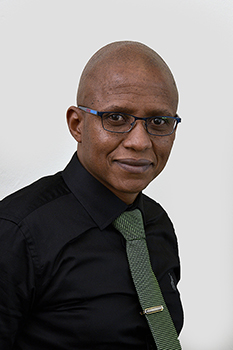Latest News Archive
Please select Category, Year, and then Month to display items
02 January 2025
|
Story Gerda-Marie van Rooyen
|
Photo Supplied
 Leading the research in South Africa is Prof Linus Franke from the Department of Soil, Crop and Climate Sciences.
Leading the research in South Africa is Prof Linus Franke from the Department of Soil, Crop and Climate Sciences.
Scientists are actively pursuing the successful breeding of diploid hybrid potatoes from inbred lines. This is expected to revolutionise potato breeding as it holds the key to rapid genetic progress. It will introduce new varieties for commercialisation through seed. Currently, existing potato variants have a gene that renders self-pollinated seeds infertile.
Prof Linus Franke, an academic in the Department of Soil, Crop and Climate Sciences at the UFS, is leading the research in South Africa. “This technology allows the production of genetically uniform potato seed that is easy to transport and largely disease-free.” He says this differs from conventional breeding whereby only vegetative propagation is possible due to tetraploid varieties in potatoes. It also risks carrying pests and diseases from one generation to the next – leading to the accumulation of pests and diseases with each round of multiplication.
Seed innovation
Prof Franke explains that Solynta BV, a seed company based in the Netherlands that produces potato varieties that can be grown from seed, has included South Africa in their research efforts because it is one of Africa’s largest producers and exporters. Through his academic relationship with Wageningen University and Research, a Dutch institution renowned for its agricultural endeavours and food production, the UFS became involved in researching hybrid potatoes grown from seed.
Diploid seeds containing two sets of chromosomes allow easier gene manipulation to increase predictability and speedier genetic progress. The breeding approach enables the incorporation of tolerance to pests, diseases, abiotic stresses (cold, heat, drought) and other desired genetic traits.
Although Prof Franke is optimistic about this research, he is not blind to disadvantages. “Potato seeds are tiny and have little energy reserves, making it harder to grow potatoes from seed than from tubers.” He says potatoes from seed will take longer to cultivate than tubers, as farmers need to grow plantlets from seeds first, adding six weeks to the growing period. “It is possible that commercial farmers can grow potatoes directly from seed. Alternatively, perhaps more likely, specialised growers will produce tubers of potatoes from seed; these tubers are then sold as seed tubers to other potato farmers, who then continue their normal practices of producing potatoes for the market from tubers.”
Financial benefits
Prof Franke says farmers have reason to get excited. “Seed potatoes will reduce input costs, as varieties with enhanced tolerance to pests and diseases require less pesticides. Planting one hectare of potatoes requires three to four tonnes of potato tubers, but only one 25 g packet of potato seeds.” Since potatoes are a more valuable commodity than maize, this technology might also increase farmers’ income potential.
New Dean of Student Affairs appointed
2016-08-23

Pura Mgolombane, newly-appointed
Dean of Student Affairs at the
University of the Free State.
Photo: Charl Devenish
“Students must always remember that people are human beings before any other identity they may embody.”
This is the message to the students of the UFS campuses from Pura Mgolombane, newly-appointed Dean of Student Affairs at the University of the Free State (UFS) in August 2016. He has replaced Cornelia Faasen, who acted as Dean from December 2014 to July 2016.
Being part of the Kovsie community
Previously, he was part of the Kovsie family as Assistant Dean of Student Life and Leadership (2011-2013). Before that, he was the Diversity, Ethics, and Social Justice Manager at the University of the Witwatersrand from August 2013 to July 2016. Mgolombane said he is most excited to “observe and experience an inclusive culture” at the university.
“I am looking forward to being part of a team that creates sufficient conditions for every member of the Kovsie community to feel that they belong here; from Qwaqwa campus, to South campus, to Bloemfontein campus.”
Making sure humanity comes first
His primary focus will be “to create Humanising Student Lived Experiences”. I want to create conditions where students feel that their humanity matters, because it is in such conditions that students are likely to excel academically,” he said.
These conditions will be created through the introduction of programmes and activities known as pedagogies, namely the humanising pedagogy and the pedagogy of discomfort. “All of these pedagogies and frameworks will be contained and further clarified in the Dean of Student Affairs Strategy which will be finalised no later than December 2016.”
Overcoming challenges faced by students
Regarding the challenges facing UFS students, Mgolombane said that “it is only when all out humanity is affirmed that we are likely to find lasting peace.
“Those who are in power or privileged positions have a responsibility to be in solidarity with the marginalised groups in pursuit of Social Justice.”